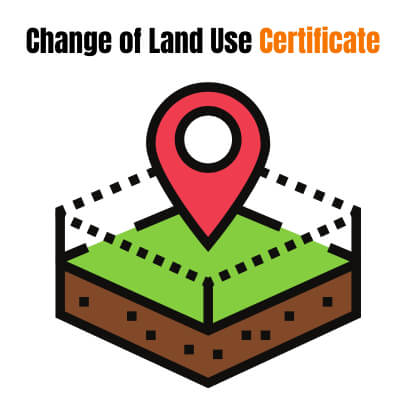
Anyone wishing to change the use of land, whether for commercial, industrial, residential, or agricultural reasons, must have a Change of Land Use (CLU) Certificate. Before beginning any construction or development, landowners or developers typically need to get this certificate from the local government.
This tutorial will explain how to get a CLU certificate, why you need one, and what paperwork you need.
Landowners can use their land for purposes different than those for which it was originally intended with the formal consent of the local government or municipal authority known as the Change of Land Use (CLU) Certificate. For instance, a CLU certificate must be obtained before the owner of a parcel of land that is registered as agricultural property can develop it for residential or commercial use.
Any growth or construction on the property would be deemed unlawful without this certificate, and any resulting penalties, fines, or even the removal of the buildings would result. Ensuring that the intended use of the land conforms with local zoning regulations is a crucial legal obligation.
A CLU certificate is necessary for the following reasons:
Here’s a detailed process to guide you through applying for a CLU certificate:
The first thing to do is to confirm the land's zoning rules. According to its growth plan, every city or town is separated into many zones. These areas set aside property for a variety of uses, including commercial, industrial, residential, and agricultural. You must verify whether your property is in a zone that can be altered by consulting the local zoning regulations prior to submitting an application for a CLU.
You can typically find this information through:
Before you proceed with the application, ensure that the land is eligible for a change in use. The eligibility criteria vary depending on the state or local body. Common conditions include:
The next step is to formally apply to the local government, usually the Municipal Corporation or the District Town Planning Office, after you have confirmed that your site qualifies. The application form is frequently available for download from the state or local government's official website.
The application form will require details such as:
You will need to attach several important documents along with the application form. The exact list of documents may vary slightly from state to state, but the most commonly required documents include:
The cost of the CLU application varies depending on the size of the land and the intended new use and is assessed by each state or local authority. Usually, you can use a demand draft or make this payment online. Since the payment receipt needs to be sent in with your application, make sure you save it as documentation.
After submitting your application and documents, the local authorities will conduct a site inspection. The purpose of this inspection is to:
The results of the site inspection will be used by the local authorities to assess your application. The authority will accept your application and grant the CLU certificate if everything conforms with local rules and regulations.
Your application can be denied, though, if there are any problems, such missing paperwork, zoning limitations, or environmental concerns. In these situations, the authority will let you know why you were rejected, and you might have to reapply once the problems have been fixed.
The CLU certificate will be issued to you upon approval of your application. You will be formally authorized to utilize your land for the new purpose by this document. You might need this certificate for future development approvals, loan applications, or other legal issues, so keep it secure.
Make sure you abide by the terms and conditions specified in the approval after you have the CLU certificate. For instance, there can be limitations on how the land can be developed or a deadline for starting the new land use. The certificate may be revoked for noncompliance with these requirements.
The complexity of the application and your location will determine how long it takes to receive a CLU certificate. Depending on how quickly the authorities do the inspection and evaluation, the total process often takes 30 to 90 days.
Visit us: Change Of Land Use Certificate
For CLU Certificate in Haryana, Please visit Haryana CLU certificate
For CLU certificate in Maharashtra, Please visit Maharashtra CLU certificate
For CLU certificate in Karnataka, Please click Karnataka CLU certificate
For CLU certificate in Gujarat, Please click Gujarat CLU certificate





We are the pioneers in offering environmental consulting services to our patrons, giving us the first mover advantage & keeping us ahead of our competitors.
Very experienced in filing, monitoring & issuance of CDSCO Certificates, Drugs Licensing, Environmental Impact Assessment, AERB certificates, Pollution Control Board CTE & CTO, Waste Management Authorization from State Pollution Control Boards, Fertilizers & Insecticides Licensing
